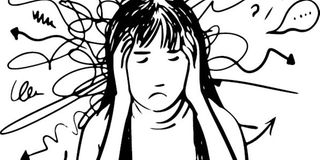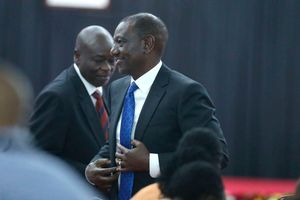Ghosts of our pasts: This is what it’s like to live in an age of trauma

What you need to know:
- As young people reach adulthood, many are realising that their past experiences, especially childhood traumas, play a significant role in shaping their mental health and worldview.
- A 2020 report by Centres for Disease Control and Prevention found that over 27 per cent of adolescents experienced at least one Adverse Childhood Experience(ACE) – a traumatic event such as abuse, neglect, or household dysfunction.
- It is little wonder, therefore, that cases of drug and alcohol abuse, suicide and mental illness among young people are on the rise.
Our childhood shapes who we are. As young people reach adulthood, many are realising that their past experiences, especially childhood traumas, play a significant role in shaping their mental health and worldview.
A 2020 report by Centres for Disease Control and Prevention found that over 27 per cent of adolescents experienced at least one Adverse Childhood Experience(ACE) – a traumatic event such as abuse, neglect, or household dysfunction.
Studies suggest a higher prevalence of childhood trauma in the current generation compared to older ones. A 2020 study by the Ministry of Labour and Social Protection reveals that one in two young adults in Kenya experienced violence as a child.
It is little wonder, therefore, that cases of drug and alcohol abuse, suicide and mental illness among young people are on the rise.

Winnie Machuka, 24
I harbour memories from age 10 which have stained the canvas of my life. My childhood was not pleasant at all. I witnessed terrible things. My father and mother were constantly arguing and fighting. I cannot count the number of times we had to run to my grandmother’s place because my mother had been sent packing after a fight. It was chaotic.
While in Class Two, we were living in a single room and one evening, while my mother cooked ugali using a jiko, we heard my father approaching while singing. He was drunk. My mother told us to hide under the bed because when in that state, he was very violent.
That day my father caused chaos. He kicked the sufuria and it landed right next to my younger brother’s head. We were still under the bed as this happened so I struggled to pull him closer so that he wouldn’t get burnt. That memory is still etched in my head. I doubt I will ever forget it.
My parents eventually separated when I was in Class Four after an incident where some Sh20 that my dad wanted to use to buy cigarettes disappeared. Everyone in the house denied taking it and my father let out his anger on me. He beat me up for three hours, as if I was a stray dog. This was the last straw. My mother carried my brother and I and we left.
I never realised the full impact of these experiences until I was in my third year in university. A friend mentioned that I had very bad mood swings. She told me people avoided me because I would easily get angry.
Growing up in a household ridden with conflict, I would read books a lot. That was my way of coping. I was the quiet child who loved books. It reached a point I could not distinguish between my reality and fiction. I had read so much fiction that the stories became my reality.
I also battled memory loss, which I think arose from that toxic family environment. To date, I forget things quickly and my memory span is short. This affected my studies as nothing would stick in my brain, except the bad childhood experiences.
Even now, most of my relationships are strained. I don’t know how to say sorry when I am wrong. While dating, I tend to compare potential partners with my father. Whenever they shout at me, my brain immediately goes back to my childhood and I start expecting them to beat me. Most of my romantic relationships have ended by the fourth month as I am always very afraid that they will lead to physical abuse.
I recently discovered the man I called my father was not my biological dad. Maybe he did all those things since he wasn’t my real father. I am looking for my real father. Whenever I ask my mother why she didn’t get out of the abusive relationship earlier, she tells me that she loved him and had hoped he would change.
In campus, I was depressed, and constantly high on bhang. I smoked a lot of it, and it made the memory loss worse, but it helped at that time. It was my escape mechanism. When high on marijuana, it was easier for me to communicate. I eventually reduced my intake and now I don’t use it at all. I turned to journaling as a coping mechanism, and I have also undergone therapy.

Elizabeth Naimutiae, 33
I had a difficult childhood. As a sixth born in a family of eight, you would expect me to be a neglected child, but there I was, the cause of conflict.
Of all my siblings, I was the only one who was keen on going to school, and this was making my parents quarrel. At the time I didn’t know that my father had already betrothed me according to the Maasai culture. My mother on the other hand was adamant that I needed to be given a chance to get an education.
My goal was to study and be someone in future, but my dad had other plans. I was frequently absent from school as I had to graze the cows. If I failed to do so, my father would beat my mother.
There was a time during one of their fights when he grabbed her by the throat and squeezed her so hard that she developed complications and was hospitalised for a week. That scene still replays in mind, and it hurts me to the core.
My father used to shout at me and sometimes beat me up. He used to make me suffer since he was set on marrying me off. He didn’t think school was a priority. I tried seeking help from the head teacher and the district officer, but it was all in vain. As a child I saw myself as worthless. I hated myself.
My father successfully married me off at 16. I dropped out at Form Two but even in Form One, my school attendance was very erratic. Luckily I was married to someone who was only six years older. Nevertheless, our union was really tumultuous. I persevered because in our culture we believe a father’s order carries with it a curse if not followed to the letter.
There was a time, while married, I even tried committing suicide. I felt so low and worthless. When I gave birth to my second child, I even lost breast milk. The child never suckled. In all the hospital visits, I was told to manage my stress levels.
I willed my brain to come to terms with everything that had happened so that I could move on with life, but it was not easy. I had to undergo therapy, and that somehow healed me.
My husband ended up changing for the better and now we are both Christians. We pray and fellowship in church together. I am now a counsellor and I believe healing is a process. Accept what is troubling you, then start letting go.

Mercyline Kao, 25
At age six, my younger brother and I were left in the care of relatives while our mother went to Nairobi to look for work. Instead of the care we needed, we faced a lot of cruelty. One memory that stands out is when I fell from a tree and injured my ankle, then my auntie repeatedly hit that ankle to punish me. She was a devout churchgoer and a sister to my mother but she became our tormentor.
My brother and I lived in constant fear. One day, a male relative attacked my brother with a jembe and nearly split his head into two. We had to flee to a neighbour’s house. This was just one of the many incidents that left us physically and emotionally scarred.
Our ordeal didn’t end when we moved to another relative’s house. We only encountered different forms of abuse. At one point, I was sexually assaulted by my cousins. The trauma was overwhelming. It left me with deep feelings of worthlessness and a pervasive fear of men that would haunt me for years.
A glimmer of hope appeared when our mother secured a stable job in Nairobi and brought us to live with her. However, escaping the past was not easy. My trust in human beings was shattered, and I often felt isolated, haunted by the memories of my childhood. I hate relatives who mistreat children left in their care. Every time I hear on the news that someone has harmed to a child, I get enraged. However, I don’t blame my mother. She didn’t know the nightmare she was exposing us to by leaving us behind.
As a teenager, I used to cry a lot and at times even as a young adult, there are days I am overwhelmed by emotions when I recall the traumatic experiences we underwent. When it comes to relationships, my male friends think I am difficult to approach because I don’t welcome or tolerate their advances.
Healing has been a long and painful process. Therapy has been instrumental, but the scars remain.
Patrick Maina, 22
My three siblings and I were brought up in a normal family setting. The person who married my mother, however, is not my biological father, and the two of them were always fighting. My dad frequently and openly beat up my mother. We would be having supper and then all of a sudden, someone gets slapped.
The man I called my father would hurl hurtful words at me and my elder brother, reminding us that we were not his children. He would tell us that we were draining his finances since he had to take care of our needs and if not for us, he would be wealthier.
These words would ring in my mind like a bell. They affected my concentration in school, yet I would be beaten to pulp for any slight dip in performance.
I have regrets for things that were not even my fault. I feel like my mother went through domestic violence because of my brother and I. I am an introvert not by nature. I forced myself to be one because my self-esteem was severely affected by my father’s hurtful and abusive words.
In high school, as a coping mechanism, I turned to alcohol and was later introduced to bhang. I was expelled due to drug abuse. I used to overdose then act mad and forget about things. Thankfully I finished secondary school. However, things became even worse in university. Due to increased freedom, I started injecting substances into my veins to calm the voices in my head.
I quit all that and now I prefer to pray and read articles about trauma management.
Boniface Waingo, 26
I was born to parents whose relationship soured shortly after I was born. I think I was only a few months old when my mother decided to leave, taking me with her. Without any notice or explanation, my mother returned to her parents' home. I spent my childhood living with my maternal grandparents, and during that period, I constantly felt out of place. I really longed for my father.
By the time I reached Grade Three, I was taken back to his father's relatives because I used to cry too much while asking for him.
I didn’t realise I had made a terrible mistake. At my father’s place, life was hard. There I was, a nine-year-old with people I didn’t have any connection with and nobody to take care of me as my mother did.
I lived through that challenging life, but the longing for a complete family continued to haunt me. I remember crying every day, and asking God to give me both parents like my peers. I felt a huge void in my life.
I remember reaching out to my mother after Class Eight asking for her support to join a boarding high school, but she refused, saying that I had chosen my father’s side and I had to face the consequences. My mother’s side of the family was wealthier than my dad’s and I knew she could afford to take me to boarding school, so her response broke my heart.
I went to a day school more than a month after the reporting day since my father struggled to find fees.
Shifting between my parents' homes while young, and the lack of family support greatly affected my mental health. Even now, I often feel anxious and I struggle to understand my place in the world.





